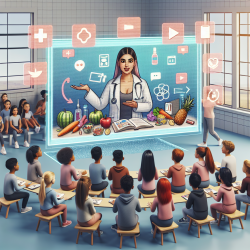Introduction
In today's digital age, social media platforms like YouTube have become pivotal in disseminating health information to young people. A recent study titled "Young People’s Experiences and Perceptions of YouTuber-Produced Health Content: Implications for Health Promotion" explores how adolescents engage with health content produced by YouTubers. This blog aims to provide practitioners with insights into how these findings can be leveraged to enhance health promotion efforts in educational settings.
Understanding the Influence of YouTubers
The study highlights that YouTubers are a significant source of health information for young people, primarily encountered during routine viewing rather than active searching. This passive absorption of health messages aligns with the concept of non-instrumental media use, where exposure during regular media consumption can effectively communicate health messages.
Practitioners can harness this by collaborating with YouTubers who already produce content on relevant health topics. By doing so, they can reach an audience already predisposed to these messages, thereby increasing the likelihood of positive health behavior changes among young people.
Relatability and Sincerity: Key Drivers of Engagement
The research identifies relatability and sincerity as crucial factors influencing young people's engagement with YouTuber health content. Young viewers perceive YouTubers as relatable when they share personal health experiences in a manner that resonates with their own. This peer-like relationship can be instrumental in reducing stigma and encouraging help-seeking behaviors.
Practitioners should consider these aspects when designing health promotion campaigns. By ensuring that the health messages are relatable and delivered with sincerity, they can foster a sense of trust and connection with the young audience.
Addressing Concerns of Generalization and Commercial Influence
While YouTubers can be effective health communicators, the study also highlights potential pitfalls such as generalization of health experiences and commercial influences. Young people may sometimes struggle to critically appraise the accuracy of the content due to these factors.
To mitigate these concerns, practitioners can focus on enhancing digital health literacy among young people. Educating them on how to evaluate the credibility of online health information and recognize commercial biases can empower them to make informed decisions about the health content they consume.
Implementing Effective Health Promotion Strategies
Based on the study's findings, practitioners can implement several strategies to improve health promotion outcomes:
- Collaborate with Influential YouTubers: Partner with YouTubers who align with the health messages being promoted to leverage their existing audience and credibility.
- Focus on Relatable Content: Ensure that health messages are relatable and resonate with the personal experiences of young people.
- Promote Digital Health Literacy: Educate young people on critically evaluating health content and recognizing commercial influences.
- Integrate Clear Indicators of Accuracy: Encourage YouTubers to incorporate clear indicators of accuracy, such as citing sources, to enhance the credibility of their content.
Conclusion
The study underscores the potential of YouTubers as effective health communicators for young people. By understanding and implementing the insights from this research, practitioners can enhance their health promotion efforts, leading to better health outcomes for children and adolescents.
To read the original research paper, please follow this link: Young People’s Experiences and Perceptions of YouTuber-Produced Health Content: Implications for Health Promotion.










